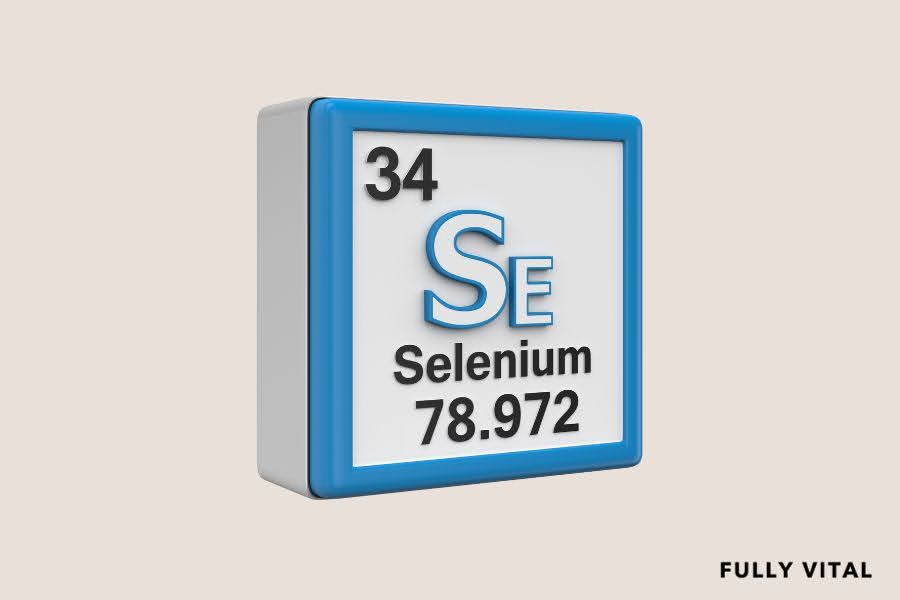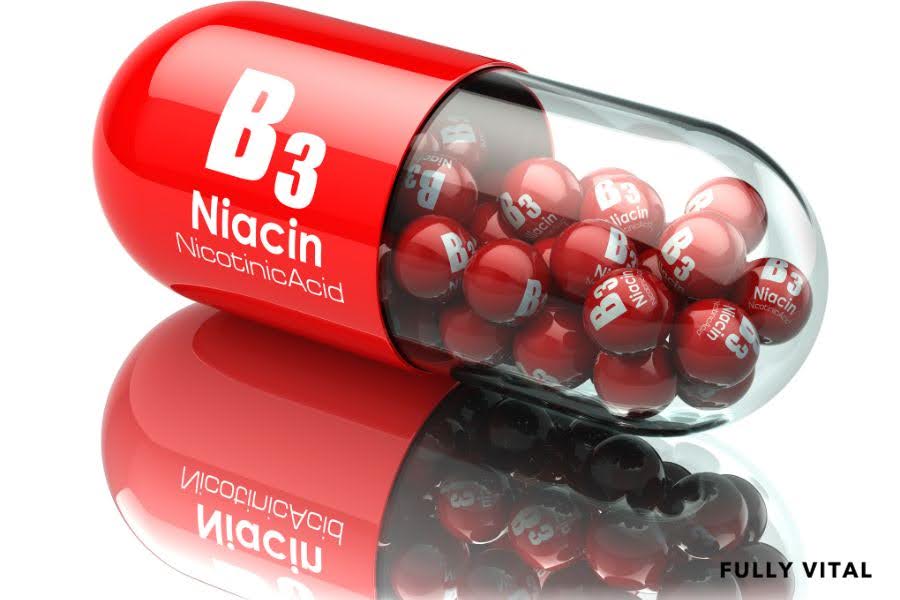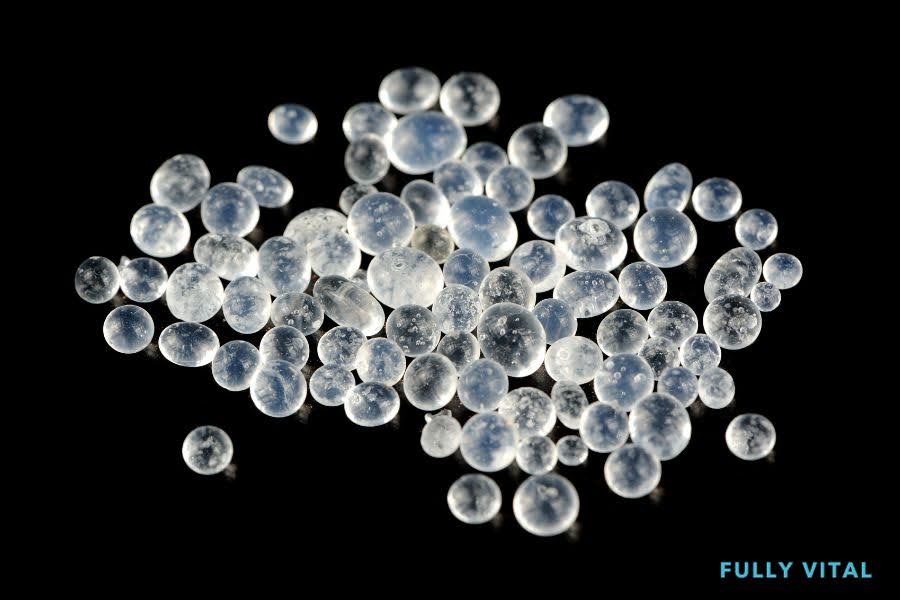
Selenium: A Scalp's Best Friend for Healthy Hair
Selenium is a trace element crucial in small doses but powerful in impact, especially concerning the health and vitality of our hair.
Understanding the influence of this essential nutrient is pivotal for sustaining not just hair health, but overall well-being.
Let's dive into the benefits of selenium for your hair.

I LOVE MY HAIR NOW
FullyVital hair serum and hair vitamins made tremendous improvements in my hair. I truly love my hair now.
Shop Hair ProductsWhat Is Selenium?
Selenium is an essential micronutrient that the body requires in small quantities.
It is a component of various enzymes and proteins, known as selenoproteins, which are crucial for reproduction, DNA synthesis, and protection from infection and oxidative damage.
Although it's not produced in the human body, selenium is vital for thyroid gland function, metabolism, and bolstering the immune system.
The significance of selenium extends beyond these functions, with emerging research linking it to the health of hair.
With its profound impact on the body, selenium cannot be overlooked when discussing healthy hair care.
What Are The Benefits Of Selenium For Hair?
Preventing Hair Loss
Adequate selenium intake is associated with hair health, particularly in preventing hair loss.
It helps the body process and regulate thyroid hormones, which in turn control hair growth.
When selenium is at optimal levels, hair follicles are more likely to stay intact, and hair is less likely to fall out.
Research also suggests that selenium's antioxidant properties can help protect hair follicles from damage caused by stress and environmental factors, which can contribute to hair loss.
Maintaining Hair Quality
Selenium doesn't just help keep hair on your head; it also plays a part in maintaining the quality of the strands.
This micronutrient assists in the production of keratin, a protein that is a primary component of hair.
By contributing to keratin's structural integrity, selenium helps maintain the strength, flexibility, and lustrous appearance of hair.
Antioxidant Role
Selenium's role as an antioxidant is pivotal.
It works within the body's natural defense system to combat free radicals—unstable atoms that can damage cells, causing illness and aging, including the premature graying and aging of hair.
By neutralizing these harmful free radicals, selenium extends its protective benefits to hair, keeping it vibrant and healthy.
FullyVital Enhance hair vitamins contain the perfect mix of selenium for optimal hair health. Give them a try today!
Is Selenium Good For A Dry Scalp?
Selenium may benefit the scalp in several ways, particularly when dealing with dryness or flakiness.
As an essential nutrient with antioxidant properties, selenium can aid in protecting the scalp against environmental damage and oxidative stress, which can lead to dryness and irritation.
Selenium And Scalp Conditions
When applied topically, as found in certain shampoos and treatments, selenium sulfide can help manage conditions such as dandruff and seborrheic dermatitis.
It works by reducing the production of natural oils (sebum) on the scalp, slowing down the growth of the yeast that can contribute to these conditions.
However, it's important to note that too much selenium, especially in supplement form, can lead to a condition called selenosis, which may cause hair loss and other adverse effects.
Therefore, balance is key.
How Much Selenium Is Recommended For Hair Growth?
The Recommended Dietary Allowance (RDA) of selenium varies depending on age, gender, and life stage.
Adults typically require 55 micrograms of selenium per day.
However, the exact amount needed for hair growth isn't explicitly defined as it falls within the general recommendations for overall health.
Age And Gender Considerations
For adult men and women, the RDA is the aforementioned 55 micrograms.
Pregnant women are advised to increase their intake to 60 micrograms, and breastfeeding women to 70 micrograms daily.
It's worth noting that these recommendations serve to prevent deficiency rather than optimize hair health specifically.
Consuming selenium within these guidelines can help maintain normal hair growth, ensuring hair follicles function properly.
Can A Selenium Deficiency Lead To Hair Loss?
Selenium deficiency, though relatively rare in well-nourished populations, can have several negative effects on the body, including hair health.
Inadequate selenium levels can disrupt hair follicles' function and may lead to hair loss, due to its role in the production of selenoproteins important for hair growth and follicle maintenance.
Selenium Deficiency Symptoms
Signs of selenium deficiency include hair loss, weakened immune function, and in severe cases, heart and bone muscle disorders.
It's crucial to identify these symptoms early and consult healthcare providers for testing and appropriate dietary adjustments.

How Can Selenium Be Balanced In A Diet?
Achieving the right balance of selenium in the diet is key to reaping its benefits without facing toxicity.
Dietary Considerations
A balanced diet with a variety of selenium sources is the best approach.
This can include a mix of lean meats, seafood, nuts, seeds, and whole grains.
Monitoring portions, especially with foods like Brazil nuts which are very high in selenium, will prevent exceeding the upper intake levels.
It's generally recommended not to consume more than 400 micrograms of selenium per day for adults to avoid toxicity.

Discover The Key Features And Benefits Of Fully Vital Hair Growth ProductsAt Fully Vital, we understand the importance of having healthy and vibrant hair. That's why we've developed a range of hair growth products that are specifically designed to combat the aging of your hair and promote a healthier relationship with your locks. Here are the key features and benefits of our products:
With Fully Vital hair growth products, you can say goodbye to aging hair and hello to a revitalized and healthy head of hair. Try our products today and experience the difference for yourself. |
Final Thoughts On Selenium
Understanding the role of selenium in our health, and particularly in the health of our hair, is critical.
As a trace element that packs a potent punch, selenium's contributions are multifaceted, ranging from protecting against oxidative damage to supporting thyroid function.
While it's clear that both deficiency and excess have significant consequences, it's also evident that a balanced intake can promote hair strength and vitality.
FullyVital Enhance hair vitamins contain the perfect mix of selenium for optimal hair health. Give them a try today!
Nutrition is a cornerstone of hair health, and selenium's presence in a variety of foods makes it accessible to most.
With proper dietary planning, the need for supplements often diminishes, underscoring the value of a varied, nutrient-rich diet.
Should supplementation be required, it must be approached with caution, adhering to recommended guidelines to avoid toxicity.
Unlock the Power of Selenium for Luscious Locks! Explore FullyVital's Hair Growth Solutions Today!
Check out our recent blogs:
- Achieve Gorgeous Hair Naturally: Batana Oil's Beauty Secrets
- Best Hair Trends This 2024
- The Waiting Game: When Does Biotin Start Working?
Frequently Asked Questions About Selenium
What happens if I don't get enough selenium?
Selenium deficiency is relatively rare but can lead to serious health issues.
It is essential for the immune system, thyroid function, and the prevention of cell damage due to its role as an antioxidant.1
A lack of selenium can result in hypothyroidism, which in turn can cause symptoms such as hair loss, fatigue, weight gain, and a slowdown in metabolism.
While dietary sources typically provide sufficient selenium, certain populations or individuals with specific health conditions may be at risk of deficiency and should monitor their intake closely.
Can taking too much selenium cause hair loss?
Yes, excessive ingestion of selenium, a condition known as selenosis, may result in hair loss, along with a swath of other symptoms.2
Selenium toxicity is most often linked to over-supplementation rather than food intake, leading to brittle nails, gastrointestinal issues, and in severe cases, neurological problems.
Since selenium can accumulate in the body over time, it's crucial to adhere to recommended dosages and consult with a healthcare provider before taking supplements.
Not just hair loss, high selenium levels can also lead to a metallic taste in the mouth and garlic breath.
What are the best food sources of selenium?
Foods rich in selenium cover a diverse range, ensuring various options for different diets.3
Seafood, such as tuna and shrimp, is known to have high selenium content, as are organ meats, such as liver.
For vegetarians, Brazil nuts stand out as a potent source, with just one or two nuts providing the daily required amount.
Whole grains and seeds, including sunflower seeds, are beneficial as well.
To make the most of these sources, incorporating a variety of these selenium-rich foods into a balanced diet is wise.
Are animal or plant sources better for selenium?
Both animal and plant sources provide selenium, catering to different dietary preferences.
Animal sources typically supply readily absorbable forms of selenium, which is advantageous for the body's utilization of this nutrient.4
Plant sources, like nuts and seeds, are not only good for selenium but also offer dietary fiber and other beneficial nutrients.
A diet inclusive of both sources can maximize selenium intake, although soil quality and geographical location can affect the selenium content of plants.
Should I use a selenium supplement for hair health?
Before turning to selenium supplements for hair health, it is advised to evaluate dietary intake.
Supplements might be unnecessary if you can obtain adequate selenium through food.5
However, in cases where an individual's diet lacks selenium or if one has specific health conditions affecting selenium levels, a supplement might be appropriate.
Consulting a healthcare professional is critical to prevent the risk of selenium toxicity and to address any underlying causes of hair health issues properly.
What are the signs of too much selenium?
Symptoms of selenium toxicity or selenosis include gastrointestinal discomfort, hair loss, nail brittleness or discoloration, and fatigue.
Individuals might also experience a metallic taste in the mouth, garlic breath, and nervous system problems like irritability or nervousness.6
If any of these symptoms appear, especially when consuming selenium supplements, medical advice should be sought to manage intake correctly.
Because the body's selenium status incrementally changes, signs of toxicity might take time to manifest.
Does selenium interact with other medications or nutrients?
Interactions between selenium and other medications, supplements, or nutrients can occur, affecting the absorption and effectiveness of selenium.7
It can interact with drugs that reduce cholesterol levels, anticoagulant medications, and some chemotherapy agents.
Selenium also has a relationship with other nutrients, like vitamin E, where synergy can potentially enhance antioxidant capabilities.
Therefore, disclosing all medication and supplement use to a healthcare provider is critical to prevent adverse effects and to ensure appropriate management.
Are there any side effects of using selenium sulfide shampoo?
Selenium sulfide shampoo, commonly used for treating dandruff and certain scalp conditions, can cause side effects like skin irritation and discoloration of hair.8
Other potential side effects include oiliness or dryness of hair and scalp, as well as temporary hair loss.
Although these side effects are usually mild and resolve upon discontinuing the use of the shampoo, they should be monitored.
It's recommended to use the shampoo as directed and to consult with a healthcare provider if side effects are causing concern.
How long does it take for selenium to affect hair growth?
The impact of selenium on hair growth can vary widely among individuals, with factors like baseline nutritional status, overall health, and consistency of intake playing roles.9
Some people may notice improvements in a matter of weeks, while for others, it could take several months.
Patience and regular monitoring of selenium intake, preferably through diet, are key to observing benefits.
If supplements are used, they should be tailored to individual needs, and changes in hair health should be documented over time.
Can children and teenagers take selenium?
Children and teenagers need selenium for growth and development, but their requirements are lower than adults.
Age-appropriate supplementation may be necessary in some cases, especially if dietary intake is insufficient.10
It's essential to follow the recommended dietary allowances for different age groups and to consult with a pediatrician before starting any new supplement.
Ensuring a balanced diet with foods rich in selenium is usually sufficient to meet the needs of this growing population.
Sources:
- Verywell Health. (n.d.). Selenium: Benefits, Side Effects, and More. Retrieved from https://www.verywellhealth.com/selenium-benefits-side-effects-and-more-7481242
- WebMD. (n.d.). Selenium: Benefits, Uses, Side Effects, Dosage, and More. Retrieved from https://www.webmd.com/a-to-z-guides/supplement-guide-selenium
- Medical News Today. (n.d.). Selenium: Health benefits, sources, and potential risks. Retrieved from https://www.medicalnewstoday.com/articles/287842
- Healthline. (n.d.). 7 Science-Based Health Benefits of Selenium. Retrieved from https://www.healthline.com/nutrition/selenium-benefits
- Office of Dietary Supplements - National Institutes of Health. (n.d.). Selenium - Health Professional Fact Sheet. Retrieved from https://ods.od.nih.gov/factsheets/Selenium-HealthProfessional/
- Cleveland Clinic Health Essentials. (n.d.). Benefits of Selenium. Retrieved from https://health.clevelandclinic.org/selenium-benefits
- Harvard T.H. Chan School of Public Health. (n.d.). Selenium. Retrieved from https://www.hsph.harvard.edu/nutritionsource/selenium/
- Healthline. (n.d.). 20 Foods High in Selenium. Retrieved from https://www.healthline.com/health/selenium-foods
- Mount Sinai. (n.d.). Selenium in diet. Retrieved from https://www.mountsinai.org/health-library/nutrition/selenium-in-diet
- MedlinePlus. (n.d.). Selenium in Diet. Retrieved from https://medlineplus.gov/ency/article/002414.htm








